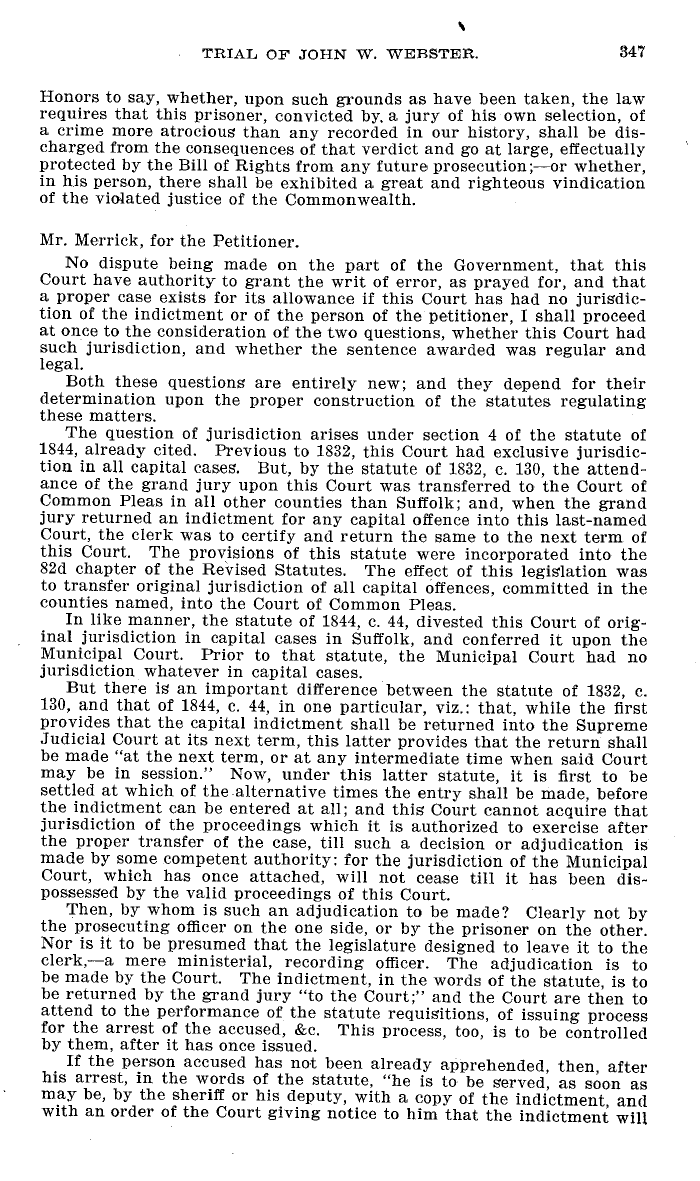|
TRIAL OF JOHN W. WEBSTER. 347
Honors to say, whether, upon such grounds as have been taken, the law
requires that this prisoner, convicted by, a jury of his own selection, of
a crime more atrocious than any recorded in our history, shall be dis-
charged from the consequences of that verdict and go at large, effectually
protected by the Bill of Rights from any future prosecution; or whether,
in his person, there shall be exhibited a great and righteous vindication
of the violated justice of the Commonwealth.
Mr. Merrick, for the Petitioner.
No dispute being made on the part of the Government, that this
Court have authority to grant the writ of error, as prayed for, and that
a proper case exists for its allowance if this Court has had no jurisdic-
tion of the indictment or of the person of the petitioner, I shall proceed
at once to the consideration of the two questions, whether this Court had
such jurisdiction, and whether the sentence awarded was regular and
legal.
Both these questions are entirely new; and they depend for their
determination upon the proper construction of the statutes regulating
these matters.
The question of jurisdiction arises under section 4 of the statute of
1844, already cited. Previous to 1832, this Court had exclusive jurisdic-
tion in all capital cases. But, by the statute of 1832, c. 130, the attend-
ance of the grand jury upon this Court was transferred to the Court of
Common Pleas in all other counties than Suffolk; and, when the grand
jury returned an indictment for any capital offence into this last-named
Court, the clerk was to certify and return the same to the next term of
this Court. The provisions of this statute were incorporated into the
82d chapter of the Revised Statutes. The effect of this legislation was
to transfer original jurisdiction of all capital offences, committed in the
counties named, into the Court of Common Pleas.
In like manner, the statute of 1844, c. 44, divested this Court of orig-
inal jurisdiction in capital cases in Suffolk, and conferred it upon the
Municipal Court. Prior to that statute, the Municipal Court had no
jurisdiction whatever in capital cases.
But there is an important difference between the statute of 1832, c.
130, and that of 1844, c. 44, in one particular, viz.: that, while the first
provides that the capital indictment shall be returned into the Supreme
Judicial Court at its next term, this latter provides that the return shall
be made "at the next term, or at any intermediate time when said Court
may be in session." Now, under this latter statute, it is first to be
settled at which of the. alternative times the entry shall be made, before
the indictment can be entered at all; and this Court cannot acquire that
jurisdiction of the proceedings which it is authorized to exercise after
the proper transfer of the case, till such a decision or adjudication is
made by some competent authority: for the jurisdiction of the Municipal
Court, which has once attached, will not cease till it has been dis-
possessed by the valid proceedings of this Court.
Then, by whom is such an adjudication to be made? Clearly not by
the prosecuting officer on the one side, or by the prisoner on the other.
Nor is it to be presumed that the legislature designed to leave it to the
clerk,-a mere ministerial, recording officer. The adjudication is to
be made by the Court. The indictment, in the words of the statute, is to
be returned by the grand jury "to the Court;" and the Court are then to
attend to the performance of the statute requisitions, of issuing process
for the arrest of the accused, &c. This process, too, is to be controlled
by them, after it has once issued.
If the person accused has not been already apprehended, then, after
his arrest, in the words of the statute, "he is to be served, as soon as
may be, by the sheriff or his deputy, with a copy of the indictment, and
with an order of the Court giving notice to him that the indictment will
|

